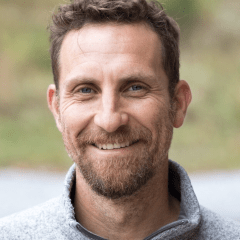Big Green Alums: Give a Rouse to Making Green Development Stick
Resilience. It certainly wasn’t the first word we ever uttered at Dartmouth as very green undergraduates, but it defined our time there in different ways. From the survival lessons brutally served up by first New Hampshire winters to the taste of a whole new level of academic rigor and competition, Dartmouth has a way of forcing people to step up to the plate.
We recently had a chance to return to Dartmouth and rise to the occasion. Invited to return as “wise alums” and facilitate a conversation with undergraduates in an environmental studies class and a general audience in the Sustainability Solutions Cafe, we spoke about what we believe it takes to make conservation stick –and to be truly sustainable, carried forward by the exemplary rural communities with whom EcoLogic works in Latin America.
We were invited by Dartmouth’s Sustainability Minor, something that didn’t exist in the mid- 90’s, when the word “sustainability” hadn’t quite achieved buzzword status. We stepped foot into Professor Coleen Fox’s classroom just before the scheduled break on a warm summer morning in Hanover. Students in the course, Environmental Studies 39: Natural Resources, Development, and the Environment, were engaged in a discussion of the idea of resilience, the importance of scale, and the contextual factors that can make solutions to conservation and development challenges so elusive. When we heard students bring up the word “resilience,” we knew that a smart and thought-provoking conversation was ahead of us.
Prior to our arrival, the class was asked to read a paper we had recently prepared for the Landscapes for People, Food, and Nature Initiative. The paper, entitled “Bridging the Gap: From the Local to the Landscape Level in Northern Honduras,” focuses on a key strategic challenge at EcoLogic. That is, how can we remain rooted locally while broadening the impact of our work to a wider geography? Students challenged us to consider how to deal with larger threats as we move to the landscape scale and how to truly empower local communities.
The students also seemed pleasantly surprised and reassured to know how such different experiences and undergraduate studies can lead to satisfying work at a mission-driven organization such as EcoLogic. Barbara, who is Panamanian and grew up in Panama City before studying anthropology and earth sciences at Dartmouth – while being involved in Latin American cultural work via La Casa and pioneering in the early years of the dance troupe SHEBA – called it a privilege to work in her “dream job.” Dave, who grew up in Orlando, FL, swam competitively throughout college, majored in English and minored in education, and learned Spanish thanks to Dartmouth’s Mexico Language Study Abroad and four years post-college in Colombia, noted how closely tied to Latin America and the Spanish language is EcoLogic’s entire staff. It was one of those moments of complete pride and satisfaction, when you know what you do matters and makes sense. Not too many people get to experience this in life, but we’re among the fortunate few.
Following our guest presenter appearance in ENVS-39, we were shown the way (not exactly recognizing the new buildings on campus) to the re-designed and way more sustainable dining services main building now known as the Class of 1953 Commons. It was a far cry from the days of all-you-can-eat industrial-strength buffets! There, we set up shop in the Paganucci Lounge for our talk in the Sustainability Solutions Cafe. Invited by Professor David Peart, an expert in tropical forest ecology, at the suggestion of former EcoLogic intern Julia McElhinney (Dartmouth class of ‘14), the Cafe is sponsored by the Sustainability Minor and Environmental Studies Program. As practitioners, it’s so important to us to be able to inform researchers, something we’ve prioritized more than ever since 2012 with involvement in strategic partnerships that include networks of researchers.
The audience was a varied and impressive lot, including students doing innovative research on food systems and seeking career advice and inspiration, the former program director for Conservation International Guatemala, the Chairman of the Donella Meadows Institute, and several professors interested in environmental science, policy, and philosophy, to name a few.
While the trip back to Dartmouth was in some ways a journey back in time, it was also an exciting glance at what looks like a bright, promising future. That future depends on a new kind of leadership, with a focus on relentless, interdisciplinary collaboration for long-term change—drawing on deep reservoirs of grit that we know the granite of New Hampshire can help forge!
This post originally appeared on the EcoLogic Development Fund's website, co-authored by Dave Kramer and Barbara Vallarino.
